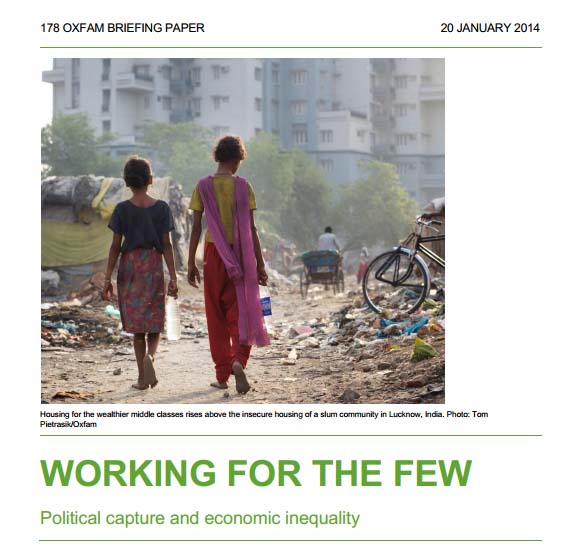Now that you know 85 people own more than half the world, here’s what to do about it
The media has done a great job covering the 85 people who own more than half the world statistic from the Oxfam report entitled: Working for the Few: Political Capture and Economic Inequality. Media examples here, here, and here.
What I didn’t realize until I read the report was that it has an excellent set of recommendations on how to improve the situation.
Since they’re excellent, the mainstream media seems to have ignored them, and I don’t think Oxfam would mind, here is their series of recommendations.
From the Oxfam report Working for the Few: Political Capture and Economic Inequality:
Call to those gathered at Davos
Those gathered at Davos for the World Economic Forum have the power to turn around the rapid increase in inequality. Oxfam is calling on them to pledge that they will:
• Not dodge taxes in their own countries or in countries where they invest and operate, by using tax havens;
• Not use their economic wealth to seek political favors that undermine the democratic will of their fellow citizens;
• Make public all the investments in companies and trusts for which they are the ultimate beneficial owners;
• Support progressive taxation on wealth and income;
• Challenge governments to use their tax revenue to provide universal healthcare, education and social protection for citizens;
• Demand a living wage in all the companies they own or control;
• Challenge other economic elites to join them in these pledges.
Policy recommendations
Oxfam has recommended policies in multiple contexts to strengthen the political representation of the poor and middle classes to achieve greater equity. These policies include:
• A global goal to end extreme economic inequality in every country. This should be a major element of the post-2015 framework, including consistent monitoring in every country of the share of wealth going to the richest one percent.
• Stronger regulation of markets to promote sustainable and equitable growth; and
• Curbing the power of the rich to influence political processes and policies that best suit their interests.
Some starting points from developing countries
The particular combination of policies required to reverse rising economic inequalities should be tailored to each national context. But developing and developed countries that have successfully reduced economic inequality provide some suggested starting points, notably:
• Cracking down on financial secrecy and tax dodging;
• Redistributive transfers; and strengthening of social protection schemes;
• Investment in universal access to healthcare and education;
• Progressive taxation;
• Strengthening wage floors and worker rights;
• Removing the barriers to equal rights and opportunities for women.











